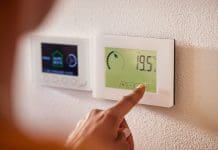The fuel crisis presents a major problem for millions of households in the UK, least of all those renting. Rising fuel costs means a hike in household bills – and the financial and mental toll on renters is significant
According to new research, 65% of renters say increasing fuel costs will make it difficult for them to pay their energy bills, and 62% state that they may not be able to afford rent this winter. An additional 57% cite the detrimental impact such worries are having on their mental health.
Can landlords help?
The research, conducted by Smart Energy GB, reveals that UK renters believe that landlords could do more to help.
Nearly half (46%) think that landlords could make their homes more energy efficient so that they can save energy and money.
Almost one-third (28%) do not feel that their landlord supports them in managing their energy use, with 85% claiming that costs will be higher because energy saving measures are not in place.
Some examples of the ways that tenants believe landlords could make their homes more energy efficient include:
- better insulation (73% renters)
- drafts filled in (54%)
- boilers upgraded (45%)
- double glazing installed (44%)
Renters are taking measures into their own hands
Despite the restrictions on managing energy use and costs that tenants may face whilst living in a rented property – many are making changes of their own accord.
Some of these environmentally friendly and cost-effective measures include everything from turning lights off (59% renters), to switching appliances off when not in use (56%), to most drastically – not turning the heating on, even when it is cold (44%).
Another popular tool is a smart meter. 67% of tenants would like a smart meter to help them manage their energy costs.
Five tips on how landlords can support their tenants to be more energy-efficient and save money:
Smart Energy GB and Propertychecklists.co.uk have provided this information
1) Get a smart meter
The smart meter provides near-real-time information on the in-home display of the user’s gas and electricity use in both Kwh and in pounds and pence so that tenants and landlords can monitor usage. This enables households to understand what drives their bills up and how they make small changes to save energy and money. What’s more, the smart meter automatically sends over readings to the energy supplier.
2) Check what eco-features the property has already
Some properties may already possess eco-friendly features – make sure to identify them. For example, some newer boilers boast an ‘eco mode’ setting that stops water from being preheated, saving the user energy and money.
3) Use LED lighting
Fitting LED lights could save £40 a year – this is significant considering the rising utility costs.
4) Fit thermostats on radiators
Thermostats allow tenants to heat only the rooms they use the most, avoiding wasting unnecessary energy and money.
5) If renovating or upgrading property: insulate
By ensuring that roof spaces, walls and floors are properly insulated less heating is needed to heat a home and therefore money is saved. Insulation on the roof can save 25% of heat loss, and overall insulation can deliver savings for around 40 years.
Advice to landlords and tenants from the experts
Kate Faulkner, the founder of Propertychecklists.co.uk, said:
“A great first starting point for landlords in terms of helping their tenants to take energy-saving steps is to arrange for a smart meter installation if they are the bill payer. Or if their tenant is the bill payer, to empower them to request a smart meter installation.
“Smart meters can also help ensure any problems with utility bill payments at the end of a lease are avoided and better still, the less money tenants spend on their utility bills means the more likely they are to be able to afford their rent payments.”
Iagan MacNeil, head of policy at Smart Energy GB said:
“Households across the country are seeing their energy costs going up, so it is more important than ever that landlords do their bit to make their tenants’ lives easier.
“It is a bill payer’s right to have a smart meter, so we hope that landlords responsible for the energy bill will consider installing a smart meter.”
Peter Smith, director of policy and advocacy at National Energy Action commented:
“Tenants in the private rented sector often face higher energy costs as they tend to live in the least efficient homes.
“Smart meters can also reduce the need for landlords to support tenants through the moving-in process and reduce disputes with things like final meter readings at the end of a lease, leading to lower costs relating to disputes. Additionally, during void periods, landlords would have an increased ability to keep the meter topped up to avoid build-up of damp in the property which could require increased maintenance.
“Whilst its right to keep your landlord informed of any changes to their properties, it is important tenants know they can access these benefits without having to have the consent of their landlord and landlords know what’s in it for them”.
The facts – smart meters
- It is the bill payer’s right to install a smart meter – if the landlord pays the bills, the decision lies with them
- Smart meters provide automatic billing and greater visibility of energy use through the in-home display
- With a smart meter in prepay mode, it is possible to top up in a variety of ways from your own home and know when you are close to using your emergency credit
- Installation takes as little as two hours at a time that suits you
- Landlords do not have to be present for installation but it’s probably worth letting them know just in case there is a clause in your tenancy agreement
- Ofgem the Energy Regulator explains that in the unlikely event that there is a clause regarding metering in your tenancy, landlords should not unreasonably prevent the installation













